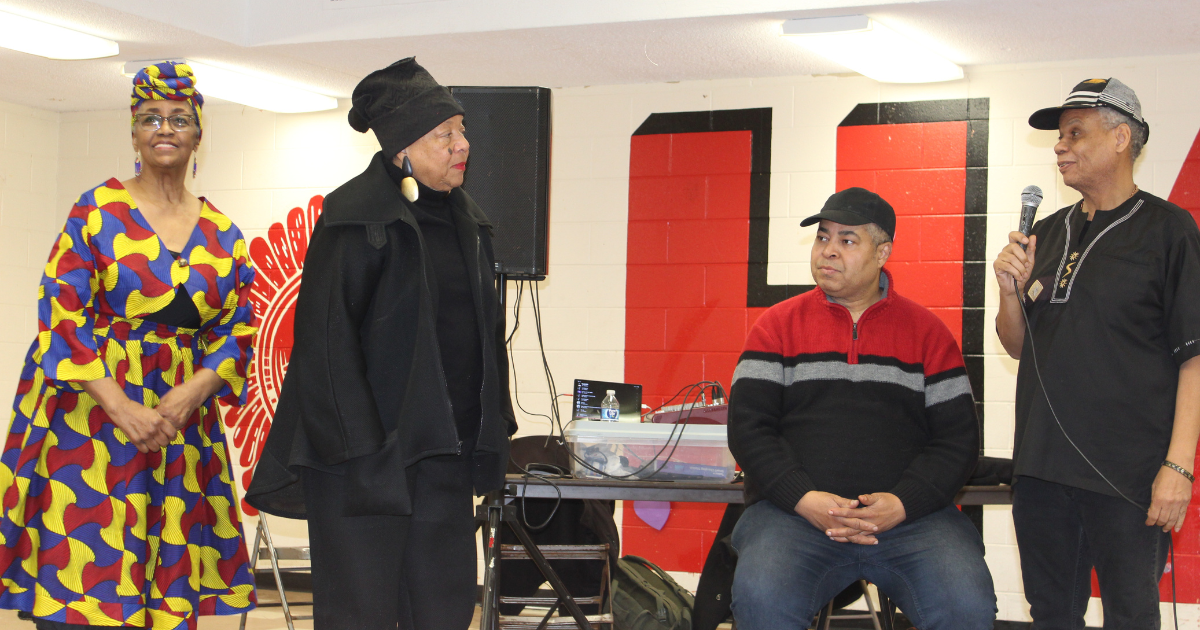Photo caption: Darlene Blackburn, Dr. Carol Adams, M. Cohran, and Stephen Kweisi Mack at Bronzeville Academy Charter School.
As a little boy, Phil Cohran’s grandmother took him to downtown Oxford, Mississippi, but when she turned the corner, both saw the dangerous beginning of the lynching of a Black man and she quickly took her grandson back home.
Reflecting on that memory that his father, jazz legend Phil Cohran, shared with him, his son, M. Cohran, said, “They were preparing to lynch a Black man with a sea of white people, children,” he said, who were eating popcorn and peanuts as if the event were a movie.
During the reign of white terror against Blacks between the Civil War and World War II, thousands were lynched including in Mississippi which, according to the Equal Justice Initiative, led the number of state recorded lynchings by 581.
“There was a sea of white folks,” his son said, “who had gathered to watch the lynching of a Black man. It was known back then that you needed to go home because sometimes after lynchings, folks may kinda (say) let’s go find some more Black folks” to hang.
Phil Cohran’s witnessing the preparation of the lynching “firmed a certain kind of passion to all civilizations and that was definitely the motivation in his life. He always knew he was a Black man, and what that meant to be a Black man in America,” M. Cohran told the audience.
Cohran made his remarks during the second day of airing the film, “Music Maestro, Please” at the Bronzeville Academy Charter School, 4930 S. Cottage Grove Ave. Bronzeville Academy Charter School Superintendent Alvin Boutte welcomed the audience to the school, the former Hales Franciscan High School site.
Lott has been in the video and film business for more than 40 years. His career began in 1982 when he had the first Black video program across the nation in 55 cities, which started the pattern of record companies producing more Black music videos.
“Phil was a very special man. I wish I had lived in Chicago myself to have known that man,” said Lott.
Asked by the Chicago Crusader about his plans for the film, M. Cohran said he would like for it to be shown not only in all public schools in Chicago but also “to expose my father to the world. We love to create interests so we can make it into a film series showing the different aspects of his life and body of work.”
“My father was a big advocate of teaching children music,” said M. Cohran, whose dad took his music into the Illinois prisons. “The band my father organized in Stateville Prison was one of the greatest bands I’ve heard.” He said due to budget cuts it no longer exists, but he has hopes that it will be restored one day.
Proud of his father, he said his dad was a continuous student, always reading about the cosmos, science and how each note related to the universe. His father taught at Northwestern University and at the Center for Inner City Studies.
Mack said it was at the Bronzeville Academy where the late Phil Cohran hosted his last music class.
Dr. Carol Adams who knew the late jazz legend said Cohran preserved everything, and he continued to study throughout his life. He taught others and promoted the community.
Born in Chicago, dancer Darlene Blackburn, 81, was trained by the late Cohran along with her dancers. She said the late Cohran would tell them whenever they stepped out publicly to remember they were ladies and who they represented. “I feel blessed to have had the opportunity to grow with him,” Blackburn said.
Cohran, who was born in Chicago, attended Kenwood Academy and was trained by his father. Even before he graduated from grammar school, he was a professional musician, often traveling with his father to different performances.
And, symbolic to the life of the late Cohran, Mack provided caterers from Miracle Foods Global, who served the audience 100 percent plant-based vegetarian meals.






